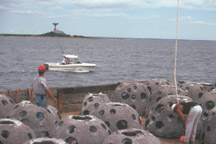|
Vincent
Malkoski
Definition of an Artificial Reef for Massachusetts'
waters:
Any area within the marine waters of the Commonwealth
in which approved structures have intentionally been placed or
constructed for the purpose of enhancing benthic relief. Such
structures may be designed to provide opportunities for recreational
and commercial fishing, aid in the management or enrichment of
fishery resources, or to achieve a combination of these
objectives.
Reef Ball units being
prepared for deployment.
 |
Artificial reefs have proliferated in the coastal and inland
waters of the U.S. over the past 30 years, but research has not yet
provided managers with enough data to accept artificial reefs as
fish management tools in all situations. Indecisiveness on the part
of mangers to support artificial reef construction has typically
centered on the decades-old question of attraction versus production
(A-P). It is likely that the answer to this question lies somewhere
in the middle, varying with coastal region, species occurrence,
habitat function for each life stage, and natural habitat abundance
and quality. Although science has not yet been able to definitively
answer the A-P question, some researchers believe that artificial
reefs have the potential to become useful tools in fisheries
management when used appropriately in conjunction with other
management practices. While debate over reef benefits will likely
continue for many years, it is apparent that many groups,
particularly salt-water anglers, divers and local governments
readily support reef development.
Massachusetts' fisheries are renewable resources that are of
importance to the economic and social needs of the people. They
contribute to the supply of valuable fisheries products, tourism,
and to state revenues. If properly managed, marine resources can be
maintained and enhanced. Interest concerning artificial reef
development has increased to new levels, producing more efforts by
outside user groups and political forces to create reefs. Total
effort in saltwater recreational fishing has grown immensely in
Massachusetts' waters over the past decade primarily because of
improved fishing conditions for striped bass. It is likely that
fishing interests will become more diverse in coming years and will
lead to fierce competition for good fishing sites. All these factors
will increase public demand for artificial reef development.
MarineFisheries is the lead agency in the Commonwealth for
the management and enhancement of marine fisheries resources, and
the promotion and development of the recreational and commercial
marine fisheries. Creation of artificial habitat can be effective in
providing additional recreational and commercial fishing
opportunities, and enhancing the forage base. This agency will
support and participate in such enhancement efforts if these
activities do not disrupt traditional fishing practices and
shipping, or adversely impact existing fish populations or habitat.
Pertinent Links
ASMFC - http://www.state.ma.us/dfwele/dmf/ProgramsAndProjects/artificia.htm#/
GSMFC
- http://www.state.ma.us/dfwele/dmf/ProgramsAndProjects/artificia.htm#/
Artificial
Reef Society of British Columbia - http://www.state.ma.us/dfwele/dmf/ProgramsAndProjects/artificia.htm#
New
England Artificial Reef Society - http://www.state.ma.us/dfwele/dmf/ProgramsAndProjects/artificia.htm# | 





